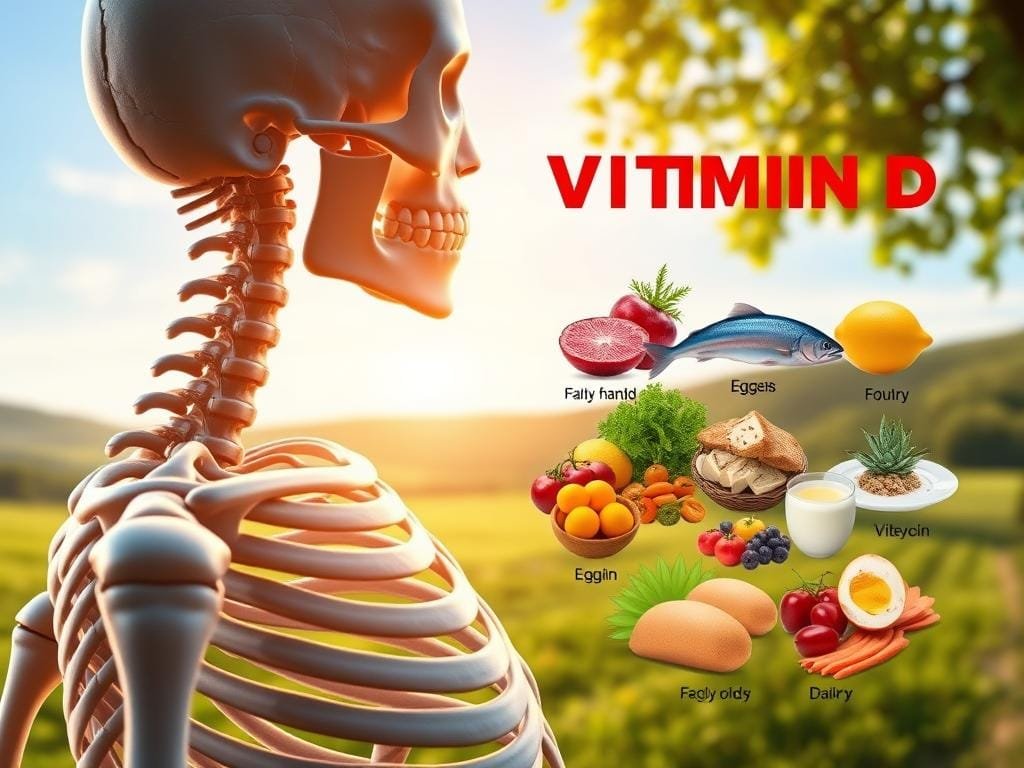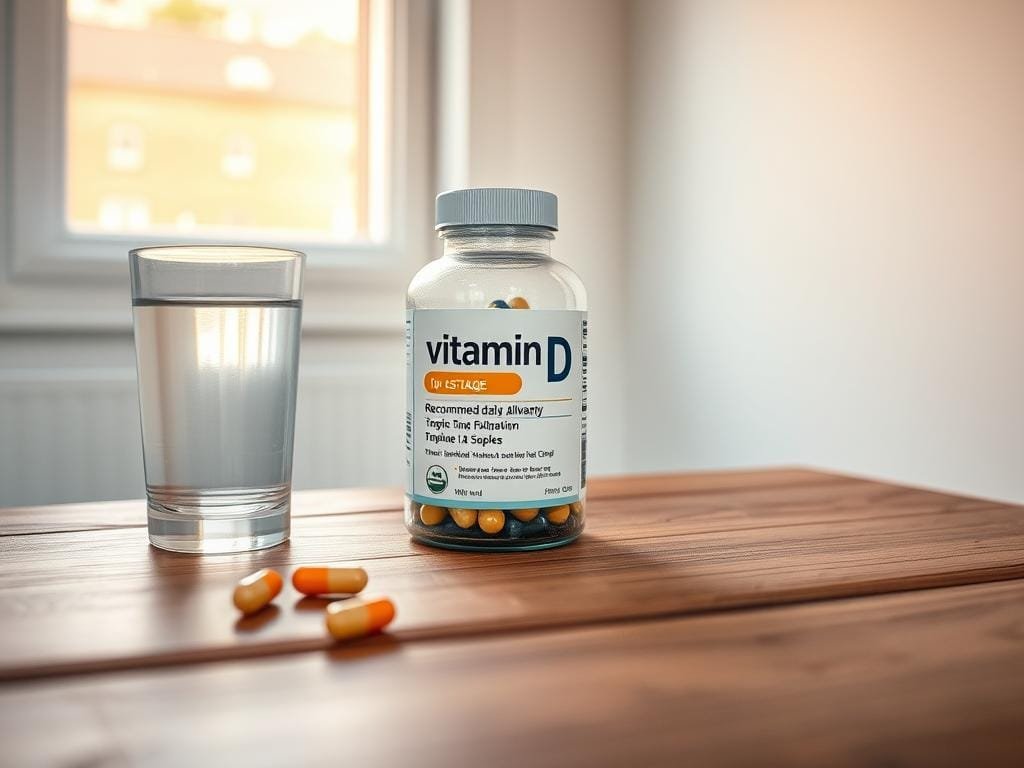Did you know that many people worldwide lack vitamin D? This lack can affect their health in big ways.
Having enough vitamin D is key for strong bones and a strong immune system. You can get vitamin D from sunlight, food, and supplements. The Office of Dietary Supplements says that the best way to check if you have enough vitamin D is by looking at your 25(OH)D levels. They say you need at least 50 nmol/L to be okay.
Knowing how important vitamin D is can help you make better health choices. Getting enough of this important nutrient can really improve your health.
Table of Contents
Key Takeaways
- Vitamin D is essential for maintaining strong bones and a healthy immune system.
- A significant portion of the population suffers from vitamin D deficiency.
- You can obtain vitamin D through sunlight, diet, and supplements.
- Maintaining adequate levels of vitamin D is vital for overall health.
- The serum concentration of 25(OH)D is the main indicator of vitamin D status.
Understanding Vitamin D: The Basics
To understand vitamin D’s importance, you need to know the basics. It’s a fat-soluble secosteroid that’s vital for your health. Learning about it helps you see how it fits into your diet. You can find more about it in the context of essential nutrients.
What Is Vitamin D?
Vitamin D is made in your skin when you’re in the sun. You can also get it from food. There are two main types: vitamin D2 (ergocalciferol) and vitamin D3 (cholecalciferol).
Vitamin D3 is made in your skin. Vitamin D2 comes from fungi and is found in some foods and supplements.
Key differences between vitamin D2 and D3:
- Vitamin D2 comes from food and supplements.
- Vitamin D3 is made in your skin when you’re in the sun.
- Vitamin D3 is better at raising vitamin D levels in your blood.
Types of Vitamin D
It’s important to know about the different types of vitamin D. There are two main types: vitamin D2 and vitamin D3.
| Type | Source | Function |
|---|---|---|
| Vitamin D2 (Ergocalciferol) | Dietary sources, supplements, fortified foods | Raises blood levels of vitamin D |
| Vitamin D3 (Cholecalciferol) | Produced in the skin upon sunlight exposure | More effective at raising and maintaining blood levels of vitamin D |
A health expert says, “Vitamin D3 is the more natural form. It’s better at raising vitamin D levels than vitamin D2.”
“The importance of vitamin D cannot be overstated, as it plays a critical role in bone health and immune function.”
Health Benefits of Vitamin D
Vitamin D is key for strong bones, but it does more than that. It’s vital for your overall health. Its role is huge.
Strengthening Your Bones
Vitamin D helps keep bones strong by controlling calcium and phosphorus. This is key for bone health and density. Adequate vitamin D levels keep your bones strong and resilient, even as you get older.

Enhancing Immune Function
Vitamin D also boosts your immune system. It helps your body fight off infections and diseases. Research shows vitamin D deficiency makes you more likely to get sick.
The importance of vitamin d in fighting off diseases is huge. It helps your body handle pathogens and lowers inflammation.
Knowing the benefits of vitamin d helps you stay healthy. Getting enough vitamin D through sun, food, and supplements boosts your health.
Sources of Vitamin D
You can increase your vitamin D levels by getting sunlight, eating certain foods, and taking supplements. Vitamin D is special because you can get it from the sun, unlike many vitamins that come from food.
Sunlight: Nature’s Best Source
Sunlight is a great way to get more vitamin D. When your skin is in the sun, it makes vitamin D. Early morning and late afternoon sunlight is best because it’s not too strong.
But, several things can change how much vitamin D you get from sunlight. These include where you live, your skin color, and the season. For example, people near the equator get more vitamin D from sunlight than those at higher latitudes.
Dietary Sources and Supplements
While sunlight is a natural source, food and supplements are also key, mainly for those who don’t get much sun. Fatty fish like salmon and mackerel are full of vitamin D. Also, fortified dairy and cereals are good choices.
A health expert says, “Eating foods rich in vitamin D can greatly improve your health.”
“Vitamin D deficiency is common, so it’s important to eat foods high in vitamin D or take supplements.”
Supplements are great for winter or for those who can’t get enough vitamin D from sun and food. Always talk to a doctor before starting supplements to find what’s best for you.
Here are some top foods for vitamin D:
- Fatty fish (salmon, mackerel)
- Fortified dairy products
- Mushrooms
- Fortified cereals
The Importance of Sun Exposure
Sunlight is key for making vitamin D in your skin. Vitamin D is vital for strong bones, a healthy immune system, and overall well-being. So, getting some sun is a must for your daily routine.
How Much Sunlight Do You Need?
The time you need in the sun to make enough vitamin D changes. It depends on your skin color, age, and where you live. Generally, 10-15 minutes of sun on your face, arms, and legs during peak hours (10 am to 4 pm) is enough. But, it can vary, and you must think about skin cancer risks too.
People with darker skin need more sun to make the same vitamin D as those with lighter skin. Older adults also need more sun because their skin makes less vitamin D.

Factors Affecting Vitamin D Production
Many things can change how much vitamin D you make from sunlight. These include:
- Clouds and pollution can block UV rays
- Using sunscreen with SPF 30 or higher can lower vitamin D production
- Being outside during peak sun hours (10 am to 4 pm) is best
- Places near the equator get more UV rays
To get the most vitamin D from the sun, go outside during peak hours without sunscreen. Then, put on sunscreen to protect your skin from UV rays. For more tips on vitamin D and health, check out Boost Healthy Life.
Knowing how sun exposure works and what affects vitamin D production helps you stay healthy. It’s about finding a balance between getting enough sun and protecting your skin from cancer. This means staying in the shade, wearing protective clothes, and using sunscreen.
Vitamin D Deficiency: Signs and Symptoms
Knowing the signs of vitamin D deficiency is key to tackling this common health problem. Vitamin D is vital for strong bones, a healthy immune system, and overall well-being.
Common Symptoms to Look Out For
Vitamin D deficiency can show up in many ways, like fatigue, bone pain, and muscle weakness. These signs can be hard to spot early because they start slowly.
Other symptoms include:
- Muscle cramps and spasms
- Bone tenderness
- Feeling generally unwell
For more info on vitamin D deficiency, check out Cleveland Clinic’s Vitamin D resource.
Risk Factors for Deficiency
Some people are more likely to have vitamin D deficiency. This includes those with limited sun exposure. Sunlight helps the skin make vitamin D.
Other risk factors are:
| Risk Factor | Description |
|---|---|
| Dark Skin | Melanin makes it harder for the skin to turn sunlight into vitamin D. |
| Age | As we get older, our skin makes less vitamin D from sunlight. |
| Certain Medical Conditions | Diseases like celiac, Crohn’s, and kidney or liver issues can mess with vitamin D absorption. |
Knowing these risk factors helps you stay on top of your vitamin D levels. For more on vitamins and minerals, see Boost Healthy Life’s guide on Vitamins and Minerals for Age.
The Role of Vitamin D in Mental Health
Research shows that vitamin D is key for mental health. It affects mood and brain function. As studies grow, so does our understanding of vitamin D benefits for mental well-being.
Connection to Mood and Cognitive Function
Vitamin D receptors are found in brain areas that control mood and thinking. Studies suggest vitamin D impacts neurotransmitters, which could affect mood and brain function. A study in the PMC found a link between vitamin D and brain health.

People with low vitamin D levels often feel sad or have seasonal affective disorder. Getting enough vitamin D through sun, food, or supplements can help mental health.
Vitamin D and Depression
Research links vitamin D deficiency to depression. Studies show people with depression have lower vitamin D levels. Vitamin D might help regulate brain chemicals and protect the brain, which could help fight depression.
“Vitamin D deficiency has been linked to an increased risk of depression, suggesting that maintaining adequate vitamin D levels may be an important aspect of mental health management.”
If you’re at risk of or have depression, check your vitamin D levels. Talk to a doctor about how to keep your vitamin D levels right. For more on vitamin D supplements, visit Boost Healthy Life.
| Aspect | Vitamin D’s Role | Impact on Mental Health |
|---|---|---|
| Mood Regulation | Influences neurotransmitter synthesis | Potential reduction in depressive symptoms |
| Cognitive Function | Supports brain health | Enhanced cognitive performance |
| Depression | Linked to lower levels of vitamin D | Addressing deficiency may help manage depression |
How to Test Your Vitamin D Levels
To make sure you have enough vitamin D, it’s key to know how to test it. Testing your vitamin D levels is easy and can tell you a lot about your health.
Different Testing Methods
Vitamin D levels can be checked with a simple blood test. This test looks at the 25-hydroxyvitamin D (25(OH)D) in your blood. It’s easy to find and most labs can do it.
Types of Tests:
- Liquid Chromatography-Tandem Mass Spectrometry (LC-MS/MS): This is one of the most accurate ways to measure 25(OH)D levels.
- Radioimmunoassay (RIA): This method is also used, but it might not be as precise as LC-MS/MS.
Understanding Your Results
After taking the test, it’s important to understand your results. The results are usually in nanograms per milliliter (ng/mL) or nanomoles per liter (nmol/L).
| Vitamin D Level (ng/mL) | Status |
|---|---|
| Less than 20 | Deficient |
| 20-29 | Insufficient |
| 30 or greater | Sufficient |
If your levels are low, your doctor might suggest vitamin D supplements. This can help you reach the right levels.
Knowing your vitamin D levels and acting on them can keep your bones strong and your health good.
Recommended Daily Allowance of Vitamin D
The amount of vitamin D you need changes with age and lifestyle. Getting the right amount is key for strong bones, a healthy immune system, and overall well-being.
Guidelines for Different Age Groups
Vitamin D needs change as you get older. Infants, kids, adults, and seniors have different needs based on their growth and health.
- Infants (0-12 months): 400-1,000 IU/day
- Children and Adolescents (1-18 years): 600-1,000 IU/day
- Adults (19-70 years): 600-800 IU/day
- Older Adults (71 years and older): 800-1,000 IU/day
These are general guidelines. Your individual needs may vary based on your health and other factors.
Adjusting Intake Based on Lifestyle
Your lifestyle affects how much vitamin D you need. For example, those who don’t get much sun may need more vitamin D from food or supplements.
Key factors to consider:
- Sun exposure: Less sun means you might need more vitamin D.
- Diet: If your diet lacks vitamin D, you might need supplements.
- Health status: Some health issues can affect how well you absorb vitamin D.
Health experts say vitamin D deficiency is common, mainly in places with less sunlight. Getting enough vitamin D is a smart way to stay healthy.

Talking to a healthcare professional can help find the right amount of vitamin D for you. This ensures you’re getting enough for your health.
Vitamin D and Chronic Diseases
Vitamin D is more than just good for bones. It also helps prevent chronic diseases. Studies show that enough vitamin D can lower the risk of many health problems. This improves your overall health and well-being.
Links to Heart Disease and Diabetes
Research links vitamin D deficiency to heart disease and high blood pressure. Vitamin D affects the heart in several ways. It helps control blood pressure and reduce inflammation.
Vitamin D is also linked to type 2 diabetes. People with low vitamin D levels are more likely to get insulin resistance and diabetes. Vitamin D helps with insulin sensitivity and pancreatic function.
Key Findings:
- Vitamin D deficiency is linked to increased cardiovascular risk.
- Lower vitamin D levels are associated with a higher risk of type 2 diabetes.
Role in Cancer Prevention
Vitamin D might also help prevent some cancers. While the evidence is not solid, vitamin D could play a role. It helps control cell growth and differentiation.
| Disease | Association with Vitamin D | Potential Mechanisms |
|---|---|---|
| Heart Disease | Reduced risk with adequate vitamin D levels | Blood pressure regulation, anti-inflammatory effects |
| Type 2 Diabetes | Lower risk with higher vitamin D levels | Improved insulin sensitivity, pancreatic beta-cell function |
| Cancer | Potential reduction in risk for certain types | Regulation of cell growth and differentiation |
In conclusion, vitamin D is key in fighting chronic diseases like heart disease, diabetes, and some cancers. Getting enough vitamin D through sun, diet, and supplements is vital for health.
Conclusion: Prioritize Your Vitamin D Intake
Keeping your vitamin D levels right is key for your health. It helps with bone strength, immune function, and mental health. Vitamin D also lowers the risk of chronic diseases.
Maintaining Optimal Vitamin D Levels
To get enough vitamin D, try sun exposure, eat vitamin D-rich foods, and use supplements if needed. Spend time outside, eat fatty fish, and talk to a doctor about supplements.
Final Thoughts on Vitamin D Importance
Knowing how important vitamin D is and taking steps to keep levels right can greatly improve your health. By following these tips, you’ll help your bones, immune system, and mental health.
